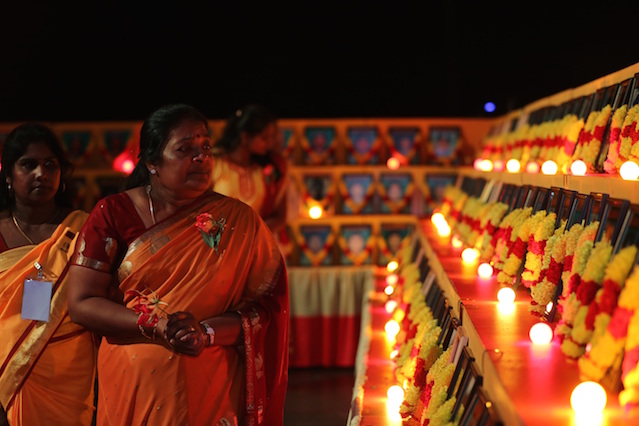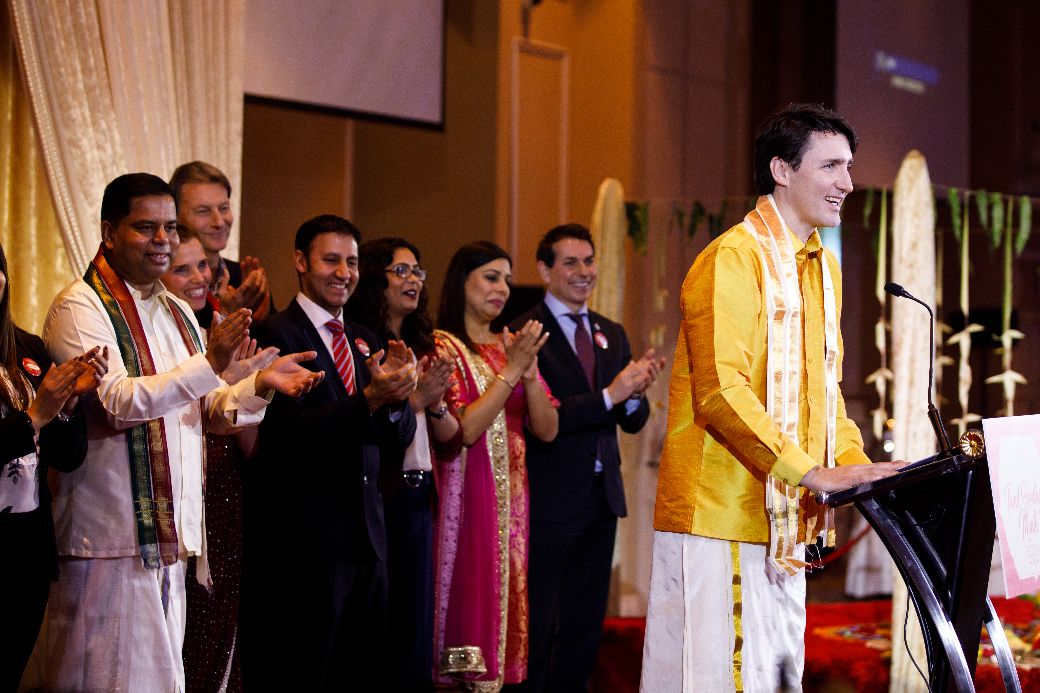
In an attempt to distance itself from the ethnic genocide of the Tamil minority it brazenly led between 1983-2009, the Sri Lankan government is now rebranding the state as an alluring tourist hub for wealthy foreigners. As designed, the world’s memory concerning the conflict has progressively slipped away, and yet simultaneously, the Tamil liberation movement perseveres. The mass migration of thousands of displaced refugees during the civil war invoked a global diaspora of Eelam Tamils who are - while still healing from war-induced trauma - thriving in closely knit communities among several pockets of the Western and European worlds. By serving as a safe haven for these refugees, the country of Canada fulfilled its reputation as a beacon of hope for the world’s disenfranchised.
You may recall the story of the boat people, who landed on Canadian shores in 1986 after escaping the Sri Lankan civil war. These 155 refugees were abandoned by a human trafficker in a treacherous region of the North Atlantic, crammed into two fibreglass lifeboats that were each designed for a maximum capacity of 35. As with any other country, Canada has not been immune to racist tendencies and fear mongering politicians. Fortunately, Canadians prevailed past the xenophobia as the sitting Prime Minister, Brian Mulroney, wholeheartedly embraced the newcomers. It is noteworthy however, that many among his Conservative party and the Canadian population fiercely opposed the admittal. Regardless, the refugees made homes in Canada with some moving to Toronto and others to Quebec. They became small business owners, factory workers, and labourers, immersed in all parts of Canadian society.

Siva Mehanathan, left to right, Suhapiramam Annalingam, Baskaran Nadarajah and Puvanendran Shanmuga sit in front of the Coast Guard ship Leonard J Cowley in St. John’s, Newfoundland on Aug. 11, 2016. (Paul Daly/CP)
Their arrival sparked the passage of thousands of Tamils fleeing Sri Lankan brutality. According to the 2016 Canadian Census, the Tamil population now numbers 157,000 in Canada, with 122,000 of them belonging to Toronto. Tamils have unilaterally altered the Canadian identity, and particularly the Canadian political landscape as a reliable ethnic voting bloc. Tamil Canadians have a vested interest in politics, rightfully viewing it as one of the only means to attain justice for the genocide inflicted upon their community. In an increasingly globalized world, where native languages and cultures deteriorate, politics also serves as an avenue to preserve Tamil heritage. As first and second generation Tamil Canadians become more engaged in politics, many of them choose to stand as candidates representing parties of all political stripes. To win, they naturally rely on the Tamil ethnic vote. An important question then arises for Tamil constituents, is voting for the welfare of Tamil people mutually inclusive with voting for a Tamil?
The Combahee River Collective, a cohort of Black feminist lesbians in the late 1900s, is attributed to coining and relaying the concept of identity politics to the mainstream. When these women first publicly championed this idea, they spoke of a politics with a foundation derived from the lived experiences and persistent oppressions of those on the fringes. They believed that social transformations within society can only be attained through resistances spearheaded by the disenfranchised themselves. As Black women, they committed themselves under an umbrella term of “identity politics,” to laying the groundwork for a politics and economic system committed to ending all forms of oppression, acknowledging that their lived experiences would provide them with the tools necessary to enact authentic progress. Ultimately, they recognized that everyone would reap the rewards of their Black-women-LGBTQ+-centric social justice movement.
The initial interpretation of this term however, strays far from its modern-day connotations. Simply stated, contemporary identity politics refers to a notion that politicians can appeal to constituents based on their group identities by assuming that an individual’s affiliation to a certain group (ethnic, sexual, religious, etc.) may predispose them to a certain ideology or way of thinking. Without offering substantive policy positions and platforms, it appears as though politicians are choosing to employ identity politics to win over votes.

Canadian Prime Minister, Justin Trudeau, at an event. Behind him is Gary Anandasangaree, a Tamil MP.

Former PC Leader, Patrick Brown, at Canada Sri Ayyappan Hindu Temple.
While the left is often accused of appealing to its base of minority demographics through identity politics, the right wing is just as culpable. This was most apparent when analyzing the most recent Canadian election within my home province of Ontario. In an unprecedented victory, the Progressive Conservative party won by a landslide, securing a majority government with 76 seats and establishing the first PC win since 1999. In this historic moment, two Tamils were elected to serve as Members of Provincial Parliament, both as Progressive Conservative party members. Understandably, many Tamil Canadians touted this moment as a milestone, and as an incremental but crucial step towards securing equitable political representation for racialized people, throughout the province.
As a historically persecuted minority, many Tamils feel a sense of shared fate, predicated upon the unique adversities we as a community have had to overcome. It’s a somewhat heartwarming idea that as a result of the legacies of colonialism, division, and conflict we have been subject to, any Tamil’s success, regardless of their gender, sexual orientation, caste, or class, is a win for us all. An anthropological term attributed to this phenomenon is fictive kinship, which refers to “imagined communities of shared interests that oppressed people live in” (Foster). Likewise, as displaced peoples who watch helplessly as the military occupation of our land continues, such a sense of unity among our diaspora surely seems to be necessary. However, this blind sense of loyalty and shared fate, and quite frankly, the lack of polarization within our community, has had real-life consequences on the domestic public policies that affect us. For instance, the two Tamil MPPs that were elected in Ontario, in large part due to the support of Tamil residents and volunteers, have consistently voted along Conservative party lines. Their Tamil heritage does not curb the disastrous effects of the policies they support. Ironically, their election, while celebrated as a step forward for Tamil Canadians, will take our people several miles back.
Vijay Thanigasalam, recently-elected Progressive Conservative MPP for Ontario
The decision of the Conservative party to cut in half the proposed increases to social assistance rates, including the disability benefit, will affect marginalized and disproportionately racialized people. The move indiscriminately affects low-income Tamil refugees relying on their disability benefit as they suffer through war-induced physical and mental impairments. Moreover, the PC-led measure to impose an anachronistic sex-ed curriculum on public schools, is just as harmful to Tamil children, regardless of whether the MPP voting in favour of it is Tamil or not. Furthermore, the Conservative party’s crusade against the fight for 15 is a detrimental blow to minimum-wage Tamil workers across the province, toiling away in often multiple, menial jobs to support their families. Namely, the PC government’s politically calculated decision to refuse to fund support for asylum seekers, should serve as a concentrated sting to Tamil Canadians. Just as the most recent influx of claimants, consisting predominantly of individuals of Haitian and Nigerian descent, arrived at the Canadian border in pursuit of a better life, it wasn’t too long ago that Tamils underwent the same circumstances. Giving into the xenophobic and bigoted rhetoric of right-wing politicians, the very Tamils whose families once benefited from the generosity of Canada seem hesitant to extend the empathy they had been offered.
The success of right-leaning politicians among Asian immigrants can partially be attributed to the group’s natural gravitation towards social conservatism. However, it often appears as though policy or political ideology have become a secondary and almost irrelevant factor in determining how many Tamils vote. Supposedly “woke” and influential Tamil youth impulsively endorse candidates that are painstakingly underqualified for a position in public office in terms of their experience in public service or evident lack of knowledge concerning the issues affecting everyday people. Political leaders and activists within our community work tirelessly to garner support for non-Tamil candidates as well - not because of the candidate’s dedication to public service or policy proposals - but because of a single, empty promise the candidate makes to support our reconciliation efforts post-civil war.
That’s not to say of course, that representation is meaningless. The lack of minority voices in politics is concerning, primarily because it results in political spaces that neglect the needs of diverse communities. However, representation void of policy-related progress is regressive and counter-productive. For example, Alexandria Ocasio Cortez is a Latina activist in New York who sent shockwaves through the political establishment after defeating incumbent Congressman Joe Crowley in the democratic primary for New York's 14th congressional district. Most noteworthy about this victory is that Cortez’s campaign accepted zero corporate PAC money, funding it solely through small dollar donations. She is now the youngest woman elected to the U.S. House of Representatives. While the media focused exclusively on her racial identity, AOC credits the victory to an unapologetically progressive agenda centered on the working class, explaining, “[t]hey see us all as racial minorities and they think we will act in the same ways […] The conversation about representation is different than identity politics. Tokenism is a problem in politics in general. The path forward is candidates that authentically represent communities.”
The path we have thus far taken as children of the Tamil diaspora, may bring us more platitudes and empty rhetoric, but achieves no justice for the thousands of brothers and sisters massacred by the authoritarian state, nor brings us any closer to the establishment of a sovereign Tamil Eelam. It simply has allowed for self-serving and power-hungry politicians to flourish on the backbones of our struggles. The 2009 Gardiner Expressway protest, in which 2,000 Tamils flooded Toronto streets to call attention to the mass genocide of our people, is evidence enough to show that when we mobilize around our causes through grassroots activism as means to enact change, our voices could not be more amplified.
Gardiner Expressway Protest (2009)
Point being - representation should never come at the cost of sound public policy. An old, white man for me, is perfectly OK, if he is committed to supporting public policy that works to uplift the marginalized. Such a man, is vastly superior to any Tamil that appropriates and co-opts the intersectional, emancipation movements of our community for political gain. This November 27, as we pin our கார்த்திகை பூக்கள் (Gloriosa Lilies) to our coats in commemoration of our fallen, let us acknowledge the innately political nature of மாவீரர் நாள் (Hero’s day). As children of the Eelam Tamil diaspora, let us employ that understanding as the framework to re-think our reconciliation strategies from here on in.
________________________________________________________________________
Sources:
Foster, Kimberly. "Identity Politics Has Veered Away from Its Roots. It's Time to Bring It Back | Kimberly Foster." The Guardian. May 05, 2018. Accessed November 25, 2018. https://www.theguardian.com/commentisfree/2018/may/05/identity-politics-veered-ideals-kimberly-foster.
Foster, Kimberly. “I’m not Rooting for Everybody Black.” Filmed June. Youtube video, 4:12. Posted June 2018. https://www.youtube.com/watch?v=P-vIsmrH0YQ.
Jones, Lindsay. “How a Newfoundland fisherman became godfather to a generation of Tamil-Canadians.” Maclean’s. Jan 31, 2018. Accessed November 25, 2018. https://www.macleans.ca/society/how-a-newfoundland-fisherman-became-godfather-to-a-generation-of-tamil-canadians/.
Russell, Andrew. “Doug Ford’s Progressive Conservatives win majority government.” Global News. June 7, 2018. Accessed November 25, 2018. https://globalnews.ca/news/4260716/doug-ford-pcs-win-majority-government/.
Zhou, Li. “Alexandria Ocasio-Cortez is now the youngest woman elected to Congress.” Vox. Nov 7, 2018. Accessed November 25, 2018. https://www.vox.com/2018/11/6/18070704/election-results-alexandria-ocasio-cortez-wins.
Zilio, Michelle. “Ottawa says Ontario must co-operate if it wants $200-million reimbursement for asylum-seeker costs.” The Globe and Mail. July 26, 2018. Accessed November 25, 2018. https://www.theglobeandmail.com/politics/article-ontarios-ford-government-demands-ottawa-cover-200-million-for-asylum/.

























